直接宾语与间接宾语
直接宾语和间接宾语)
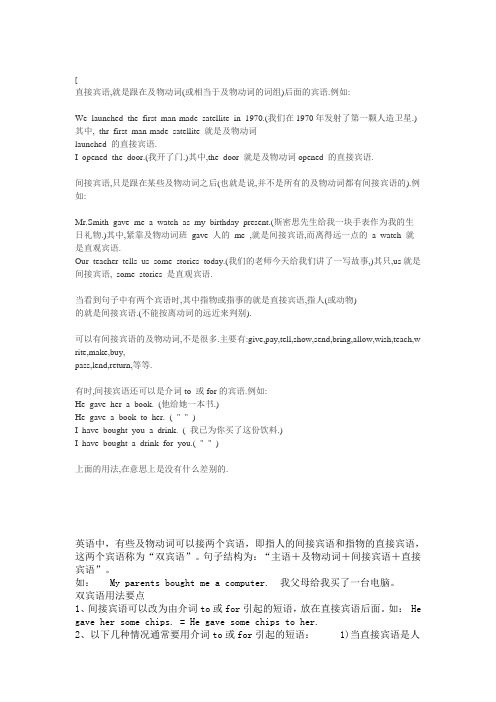
[直接宾语,就是跟在及物动词(或相当于及物动词的词组)后面的宾语.例如:We launched the first man-made satellite in 1970.(我们在1970年发射了第一颗人造卫星.) 其中, thr first man-made satellite 就是及物动词launched 的直接宾语.I opened the door.(我开了门.)其中,the door 就是及物动词opened 的直接宾语.间接宾语,只是跟在某些及物动词之后(也就是说,并不是所有的及物动词都有间接宾语的).例如:Mr.Smith gave me a watch as my birthday present.(斯密思先生给我一块手表作为我的生日礼物.)其中,紧靠及物动词班gave 人的me ,就是间接宾语,而离得远一点的a watch 就是直观宾语.Our teacher tells us some stories today.(我们的老师今天给我们讲了一写故事,)其只,us就是间接宾语, some stories 是直观宾语.当看到句子中有两个宾语时,其中指物或指事的就是直接宾语,指人(或动物)的就是间接宾语.(不能按离动词的远近来判别).可以有间接宾语的及物动词,不是很多.主要有:give,pay,tell,show,send,bring,allow,wish,teach,w rite,make,buy,pass,lend,return,等等.有时,间接宾语还可以是介词to 或for的宾语.例如:He gave her a book. (他给她一本书.)He gave a book to her. ( " " )I have bought you a drink. ( 我已为你买了这份饮料.)I have bought a drink for you.( " " )上面的用法,在意思上是没有什么差别的.英语中,有些及物动词可以接两个宾语,即指人的间接宾语和指物的直接宾语,这两个宾语称为“双宾语”。
直接宾语和间接宾语和宾语补足语的区别?
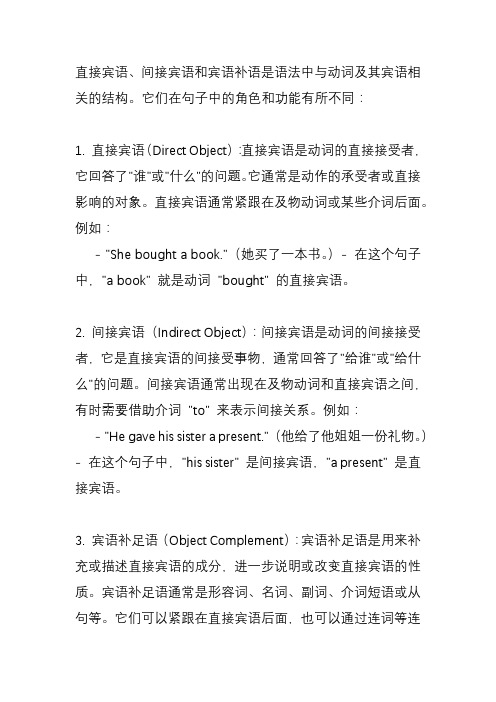
直接宾语、间接宾语和宾语补语是语法中与动词及其宾语相关的结构。
它们在句子中的角色和功能有所不同:1. 直接宾语(Direct Object):直接宾语是动词的直接接受者,它回答了"谁"或"什么"的问题。
它通常是动作的承受者或直接影响的对象。
直接宾语通常紧跟在及物动词或某些介词后面。
例如:- "She bought a book."(她买了一本书。
)- 在这个句子中,"a book" 就是动词"bought" 的直接宾语。
2. 间接宾语(Indirect Object):间接宾语是动词的间接接受者,它是直接宾语的间接受事物,通常回答了"给谁"或"给什么"的问题。
间接宾语通常出现在及物动词和直接宾语之间,有时需要借助介词"to" 来表示间接关系。
例如:- "He gave his sister a present."(他给了他姐姐一份礼物。
)- 在这个句子中,"his sister" 是间接宾语,"a present" 是直接宾语。
3. 宾语补足语(Object Complement):宾语补足语是用来补充或描述直接宾语的成分,进一步说明或改变直接宾语的性质。
宾语补足语通常是形容词、名词、副词、介词短语或从句等。
它们可以紧跟在直接宾语后面,也可以通过连词等连接到直接宾语后面。
例如:- "They elected him president."(他们选举他为总统。
)- 在这个句子中,"president" 是宾语补足语,进一步说明了"him"(直接宾语)的身份。
需要注意的是,不是每个动词都需要同时具有直接宾语、间接宾语和宾语补足语,不同的动词具有不同的语法要求。
初中知识点归纳直接和间接的宾语从句
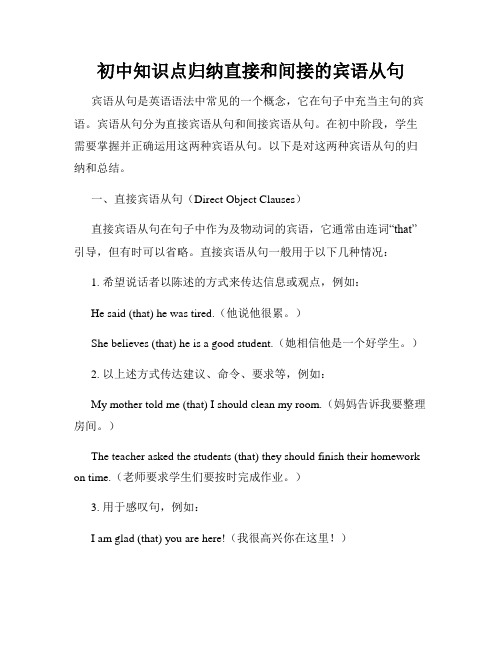
初中知识点归纳直接和间接的宾语从句宾语从句是英语语法中常见的一个概念,它在句子中充当主句的宾语。
宾语从句分为直接宾语从句和间接宾语从句。
在初中阶段,学生需要掌握并正确运用这两种宾语从句。
以下是对这两种宾语从句的归纳和总结。
一、直接宾语从句(Direct Object Clauses)直接宾语从句在句子中作为及物动词的宾语,它通常由连词“that”引导,但有时可以省略。
直接宾语从句一般用于以下几种情况:1. 希望说话者以陈述的方式来传达信息或观点,例如:He said (that) he was tired.(他说他很累。
)She believes (that) he is a good student.(她相信他是一个好学生。
)2. 以上述方式传达建议、命令、要求等,例如:My mother told me (that) I should clean my room.(妈妈告诉我要整理房间。
)The teacher asked the students (that) they should finish their homework on time.(老师要求学生们要按时完成作业。
)3. 用于感叹句,例如:I am glad (that) you are here!(我很高兴你在这里!)What a surprise (that) she passed the exam!(她竟然通过了考试,真令人惊讶!)需要注意的是,直接宾语从句通常不使用疑问词引导。
二、间接宾语从句(Indirect Object Clauses)间接宾语从句在句子中作为及物动词的间接宾语,通常使用连词“that”引导,但同样也可以省略。
间接宾语从句一般用于以下几种情况:1. 表达希望或建议,例如:She suggested (that) we should go to the park this weekend.(她建议我们这个周末去公园。
初中英语知识点归纳直接宾语和间接宾语的用法
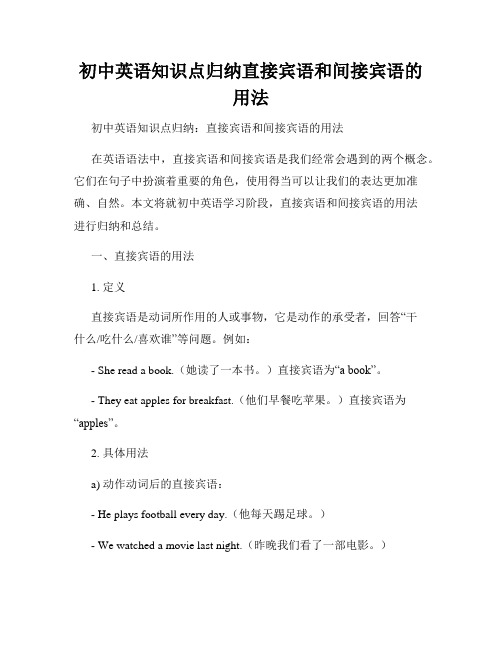
初中英语知识点归纳直接宾语和间接宾语的用法初中英语知识点归纳:直接宾语和间接宾语的用法在英语语法中,直接宾语和间接宾语是我们经常会遇到的两个概念。
它们在句子中扮演着重要的角色,使用得当可以让我们的表达更加准确、自然。
本文将就初中英语学习阶段,直接宾语和间接宾语的用法进行归纳和总结。
一、直接宾语的用法1. 定义直接宾语是动词所作用的人或事物,它是动作的承受者,回答“干什么/吃什么/喜欢谁”等问题。
例如:- She read a book.(她读了一本书。
)直接宾语为“a book”。
- They eat apples for breakfast.(他们早餐吃苹果。
)直接宾语为“apples”。
2. 具体用法a) 动作动词后的直接宾语:- He plays football every day.(他每天踢足球。
)- We watched a movie last night.(昨晚我们看了一部电影。
)b) 部分及物动词需借助介词来构成短语动词,其中介词后的宾语为直接宾语:- They are looking for a solution to this problem.(他们正在寻找这个问题的解决办法。
)- She took care of her sick grandmother.(她照顾她生病的祖母。
)3. 疑问词+动词+直接宾语疑问词可以用来引导一个包含直接宾语的问句。
常见的疑问词有:what,which,who等。
例如:- What did you eat for lunch?(你午餐吃了什么?)- Who did you invite to the party?(你邀请了谁参加派对?)二、间接宾语的用法1. 定义间接宾语是动词直接作用的对象,表示给予、告诉、送、写等动作的间接对象,回答“给谁/说给谁/寄给谁”等问题。
例如:- My mom gave me a book.(妈妈给了我一本书。
直接宾语和间接宾语的位置

直接宾语和间接宾语的位置直接宾语和间接宾语是英语语法中的两个重要成分,它们在句子中起到了为动词提供宾语和受益者的作用。
直接宾语是动作的承受者,而间接宾语则接收直接宾语的影响。
在英语句子中,直接宾语和间接宾语的位置可以发生变化,下面我们将详细探讨这个问题。
一、直接宾语和间接宾语的基本概念直接宾语是动作的承受者,它接受动作直接作用的对象。
在句子中,它通常回答“谁”或“什么”的问题。
例如,在句子“The boy kicked the ball.”(这个男孩踢了那个球。
)中,“the ball”就是直接宾语。
间接宾语是接收直接宾语行为的对象,它通常回答“给谁”、“说给谁”等问题。
例如,在句子“He gave me a present.”(他给了我一份礼物。
)中,“me”就是间接宾语。
二、直接宾语和间接宾语的位置变化规则在英语句子中,直接宾语和间接宾语的位置可以发生变化。
下面是一些常见情况的示例:1. 给予动词在给予动词(如give、send、offer等)的句子中,直接宾语和间接宾语的位置可以互换。
例如:- He gave me a present.(他给了我一份礼物。
)- He gave a present to me.(他给了我一份礼物。
)2. 介词短语当直接宾语和间接宾语都是介词短语时,它们的位置通常是不可互换的。
例如:- She talked to me about her problems.(她向我倾诉了她的问题。
)- She talked about her problems to me.(她向我倾诉了她的问题。
)3. 同时出现的情况当直接宾语和间接宾语同时出现在句子中时,它们的位置通常是固定的,直接宾语在间接宾语前面。
例如:- He showed his ID card to the security guard.(他向保安出示了他的身份证。
)- She told her friend a secret.(她向她的朋友透露了一个秘密。
直接宾语间接宾语

直接宾语间接宾语
宾语是定语从句中受动词影响的一种句子成分,包括直接宾语和间接
宾语。
它们从语法上来说都是相同的,但可以有很大的不同,以满足
定语从句的特殊要求。
直接宾语是作动词的宾语,它需要直接说明或指出动作的受益者或对象。
例如:He bought me a book。
在这个句子中,动词“buy”的直
接宾语是“a book”,因为动词“buy”的行为直接影响了一本书。
间接宾语是指作动词的宾语,它不是指动作的直接受益者或对象,而
是指主语说话的对象。
例如:He told me the truth。
在这句话中,
动词“tell”的间接宾语是“the truth”,因为这句话不仅提到了对
话的主题,也提到了对话的参与者。
两种宾语都表示定语从句中的受动词影响的句子成分,因此他们是定
语从句中重要的成分。
直接宾语是定语从句中受动词影响的句子成分,它能够增加动词解释的一般性和精确性,而间接宾语是定语从句中受
动词影响的句子成分,它能够增加对动词行为条件的限制。
在口语中,大多数情况下,直接宾语和间接宾语可以互换使用,但是,在书面语言中,我们必须根据具体句子的意思和表达形式来决定选择
哪种形式才能体现出句子的意思。
总的来说,要正确使用直接宾语和间接宾语,我们必须熟悉这两种宾
语的特点以及该如何正确使用它们。
因此,我们应该努力学习它们的
特点以及正确使用它们的方法,以提高我们的语言表达能力。
间接宾语和直接宾语的区别例句
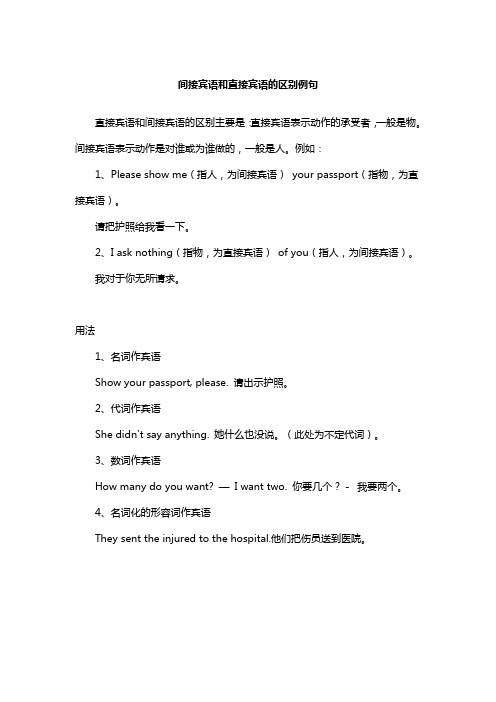
间接宾语和直接宾语的区别例句
直接宾语和间接宾语的区别主要是:直接宾语表示动作的承受者,一般是物。
间接宾语表示动作是对谁或为谁做的,一般是人。
例如:
1、Please show me(指人,为间接宾语)your passport(指物,为直接宾语)。
请把护照给我看一下。
2、I ask nothing(指物,为直接宾语)of you(指人,为间接宾语)。
我对于你无所请求。
用法
1、名词作宾语
Show your passport, please. 请出示护照。
2、代词作宾语
She didn't say anything. 她什么也没说。
(此处为不定代词)。
3、数词作宾语
How many do you want? —I want two. 你要几个?-我要两个。
4、名词化的形容词作宾语
They sent the injured to the hospital.他们把伤员送到医院。
直接宾语和间接宾语_句子成分 英语语法.doc

直接宾语和间接宾语_句子成分有些及物动词可以有两个宾语,一个指人,一个指物,前者叫作间接宾语;后者叫作直接宾语。
用法如下:1、直接宾语可由名词、代词、数词、不定式充当。
间接宾语是指动词的行为所指向的人。
间接宾语由名词或宾格代词充当。
间接宾语一般放在直接宾语之前,但有时当直接宾语比间接宾语短得多时,或当我们特别强调间接宾语时。
E.g:Remember to write us a letter please. 请记着给我们写信。
I will return the book to you tomorrow. 我明天还你书。
Fetch a chair for me, will you? 给我取一把椅子好吗?2、当间接宾语为人称代词,同时直接宾语也是人称代词时,也将间接宾语放在直接宾语之后。
E.g:I have found the book and give it to her.我找到了那本书,并给了她。
3、间接宾语只能用在某些动词的后面,常见的这类动词有:give, show, send, bring, offer, read, pass, lend, leave, hand, tell, return,write, pay, point, play, save, spare, order, sing, find等。
E.g:The teacher gave us a lot of homework.= The teacher gave a lot of homework to us.老师留给我们很多作业。
He bought flowers for his girlfriend.= He bought his girlfriend flowers. 他给女友买花。
He threw the ball to me, and I caught it.= He threw me the ball, and I caught it.他把球扔给我,我接住了。
- 1、下载文档前请自行甄别文档内容的完整性,平台不提供额外的编辑、内容补充、找答案等附加服务。
- 2、"仅部分预览"的文档,不可在线预览部分如存在完整性等问题,可反馈申请退款(可完整预览的文档不适用该条件!)。
- 3、如文档侵犯您的权益,请联系客服反馈,我们会尽快为您处理(人工客服工作时间:9:00-18:30)。
3.Mr. Smith apologized _____ the lady _____ what B his son had done.
A.to; to B.to; for C.for; to D.for; for
A 4.Read the letter and ____ him.
A.pass it on to C.pass it for B.pass on it to D.pass it on
注意下面句子的区别 •Kate wrote a letter to her mother.
•Kate wrote a letter for her mother.
To表示给、到,for表示 对某人有益的事
用to 或for填空
• She picked a few apples for me . • she handed the purse to the teacher. • Bring another bottle of wine to our guest. • Shall I prepare anything special for them? • Fetch a few chairs for us,ok?
8.My mum showed me some pictures of the big modern city. 9.When people asked me the question why I wanted to do this,I answered, … 10.My coach brought me a bottle of water.
Mother made Mary a new coat. →Mother made a new coat for Mary. 妈妈为玛丽做了一件新大衣。
He bought me a new book. →He bought a new book for me. 他给我买了本新书。
常见的这类动词有:
Answers to Ex.2:
1.His mother bought him a computer.
2.Please lend one yuan to me. 3.Please give me the cheque.
4.Tom asked me to bring him an
umbrella. 5.Could you tell me the time?
His mother gave him a new bag. →His mother gave a new bag to him. I gave him some money. →I gave some money to him. 我给了他一些钱。
She brought me a big egg.
Five Basic Sentence Patterns
主语-系动词-表语 主语-动词
主语-动词-宾语
主语-动词-宾语-宾语 主语-动词-宾语-宾语补足语
What is direct and indirect object? •He gave me a book. me是 间接宾语 a book 是直接宾 语
总 结
Exercises:
A 1.Can you explain _______? A.this problem to me C.to me problem B.me this problem D.me problem
B 2.He made a new dress_____ his wife and gave it _____ her on her birthday. A.to; for B.for; to C.for; for D.to; to
D.We were taught physics by Mr. Wang last year.
翻译下列各句: 1.Johnson 先生去年教我们德语。 Mr. Johnson taught us German last year. 2. 奶奶昨晚给我们讲了一个有趣的故事。 Grandma told me an interesting story last night. 3. Mary把钱包交给校长了。 Mary handed the wallet to the schoolmaster.
11.My coach gave every team member a swimming-suit. 12.People gave me many prizes
4.They paid me 2,000 yuan a month. 5.A customer told me the news that those who are… 6.I sent the local sports committee an e-mail, saying that…
7.I wrote the National Sports Committee a letter about the same thing.
翻译下列各句: 4. 请把那本字典递给我好吗? Would you please pass me the dictionary? 5. 他把车票给列车员看。 He showed the ticket to the conductor. 6. 这个学期我已经给父母写过三封信了。
This term I have written three letters to my parents.
----She brought a big egg to me.
He gave the cleaner his key.
----He gave his key to the cleaner. 他把钥匙给了清洁工。
常见的这类动词有: give, pay, show, owe(欠), send, bring, take ,mail,offer, read, pass, lend, leave, hand, tell, return, write, throw, allow, wish, teach, promise, award (授 予) accord (使一致,给予), grant (假定;授予)等。
2.verb+sb+sth=verb + sth. +for + sb. 这类动词后面的间接宾语后置时,间接宾语 前要用介词for。 Fetch us a few chairs, will you? →Fetch a few chairs for us, will you? 给我们搬几把椅子来,行吗?
B 7.Which of the following is not true?______
A.Mr. Wang taught us physics last year.
B.Mr. Wang taught our physics last year.
C.Mr. Wang taught physics to us last year.
5.Which one is not right?_______ C
A.Will you do me a favour?
B.Will you do a favour for me? C.Will you do a favour to me? D.Will you do me the favour to help me with my English? 6.The little boy wanted to have a book as his A birthday present, but the cruel stepmother ____ him his request. A.refused B.answered C.gave D.promised
直接宾语表示动作的承受者,一 般是物。间接宾语表示动作是对 谁或为谁做的,一般是人。
可接双宾语的动词依据其所搭erb+sb+sth=verb + sth. + to + sb. 这类动词后面的间接宾语后置时,间接宾语 前要用介词to。 Please show me your passport. →Please show your passport to me. 请把护照给我看一下。 I will return you the book tomorrow. →I will return the book to you tomorrow. 书我明天还你。
make (制造), buy, do, fetch (取 来), get, paint , draw (绘画), play (弹,奏), save (节约,省下), reserve (保留,预定), spare (抽 出),order (定购), cook (烹调), sing, find , build, change, choose, prepare,pick等。
Answers to Ex. 3: 1.This summer my grandpa bought some books for me. 2. This summer my friends sent me short messages. 3. This summer my aunt and uncle
Answers to Ex. 1:
1.Please try to find that book for me.
2.I would like you to book for us a table by the window. 3.I can’t wait to show these photos to my parents. 4.Has Mother left some food to us in the fridge? 5.I forgot to send a birthday card to Alice.
brought candy to me.
4. This summer I taught English to my
